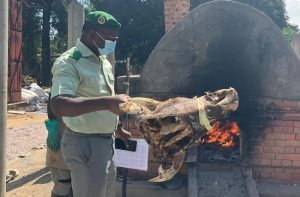Benin has publicly destroyed a substantial quantity of seized wildlife products for the first time in its history, marking a significant step towards combating illegal wildlife trade and protecting the nation’s biodiversity.

The incineration event took place in Cotonou, the largest city in Benin, with representatives from various government agencies, Nature Tropicale Organisation, and wildlife conservation experts in attendance. Ministry for the Environment and Transport, in charge of Sustainable Development, in collaboration with the Elephant Protection Initiative (EPI) Foundation, are methodically reducing seized wildlife products weighing about 155.9 KG, to ashes today.
“The illegal wildlife trade poses a grave danger to our country’s biodiversity and natural legacy. Benin stands firm in its commitment to combating this crisis. By incinerating these wildlife products, we are making it clear that wildlife trafficking will not be allowed to persist here. We are determined to take all necessary actions to safeguard our unique ecosystems and protect endangered species from extinction,” said Rémi Hefoume, Director General of Water, Forests and Hunting at the Ministry for the Environment and Transport, in charge of Sustainable Development.
As part the EPI’s objective to keep ivory out of economic use, and with support of the U.S Bureau of International Narcotics and Law Enforcement Affairs, the EPI said that it has been working with the Government of Benin and Nature Tropicale, the local NGO partner, to improve the management of wildlife products seized or recovered to ensure they are effectively managed and do no reenter into the illegal wildlife trade.
“Standard operations procedures have been developed and implemented through training and mentoring, storerooms strengthened and equipped. This disposal comes after a nationwide inventory of items in storage undertaken and items centralised, sending a clear message of no tolerance of the illegal wildlife trade,” added the group.
“Benin’s choice to destroy confiscated wildlife products sets a powerful precedent for nations taking decisive steps to safeguard their natural heritage and join the global effort against wildlife crime,” said Ruth Musgrave, Director of Programmes at the EPI Foundation.
Environmental organisations and wildlife advocates have praised Benin’s actions, hailing them as a positive step toward curbing the illegal wildlife trade. They have called for continued cooperation between government agencies, civil society, and international partners to strengthen enforcement efforts and raise awareness about the importance of preserving biodiversity.
